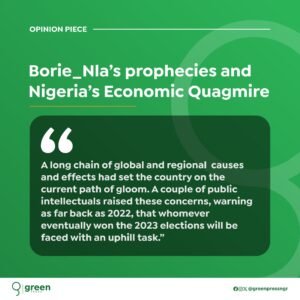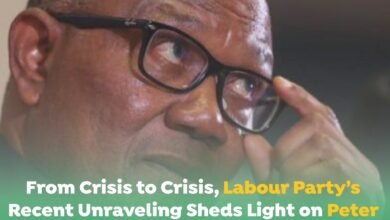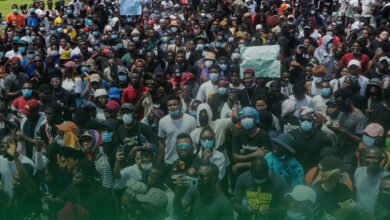
The economic challenges presently witnessed by Nigeria is not strange. All through the country the noose of hardship has tightened around the neck of citizens, cutting across social classes, regions, and faith. But widespread as it may, thereby leading to a consensus of criticism against the government, it is important to remember that there are traceable root causes of the present ordeal, some of which are global and aptly predicted, and all of which predate this administration.
Taking the reins of government powers on May 29th 2023, which is yet to turn a full year, the Ahmed Bola Tinubu’s administration simply took charge of a country on a pedestal. A long chain of global and regional causes and effects had set the country on the current path of gloom. A couple of public intellectuals raised these concerns, warning as far back as 2022, that whomever eventually won the 2023 elections will be faced with an uphill task.
Writing on May 1 2022, a public policy analyst and agriculture consultant, @borie_nla, argued that he had “gone through three reports on food prices in 5 days and [he] sincerely pray whoever wins the 2023 elections knows the task they are up against”. This analyst was convinced that a revolt might arise occasioned singularly by galloping food prices. This was one year before Bola Ahmed Tinubu came to power.
These galloping food prices, now a reality, have, in turn, deeper root causes. For example, just in consonance with Borie’s argument two years ago, there has been significant increases in prices of fertilizers, specifically DAP (diammonium phosphate) and potash, which has impacted crop production globally. This situation is further worsened by the challenges of affordability and accessibility of fertilizers in Africa even in the face of local production or cheaper prices in international markets experienced by the Nigerian farmer.
The Russia-Ukraine war compounds the matter. Ukraine is the foremost international supplier of wheat and other agro produce. But locked in a war that has seen large and growing chunks of the country occupied by Russian forces, production and international supply and distribution of these produces and other vital agricultural elements has dried up, if not entirely ceased. The ripple effect of this and other connected factors is the worldwide shortfall in the harvests of rice, wheat, corn, and soybean, which are used in directly feeding livestocks or producing livestock feeds. This declining production therefore leads to price increase in food items like catfish, chicken, turkey, and eggs due to the rising prices of corn, wheat, rice, and soybeans occasioned by reduced supply.
The Ahmed Tinubu administration is nonetheless unfazed by these reality. The man himself was abreast with these global facts before entering the presidential race and eventually winning it. What it however needs is the time for the policies it has formulated and put into execution to take effect and achieve set goals. Some of these has begun to yield fruit as these policies and projects are getting executed faster after the administration has cut out the weight of bureaucracy and absence of transparency ailing the civil service before its assumption, exactly one of the things Borie lamented in his 2022 analysis.

Do you have an opinion article you would like to publish? Send to opinions@greenpress.ng.





